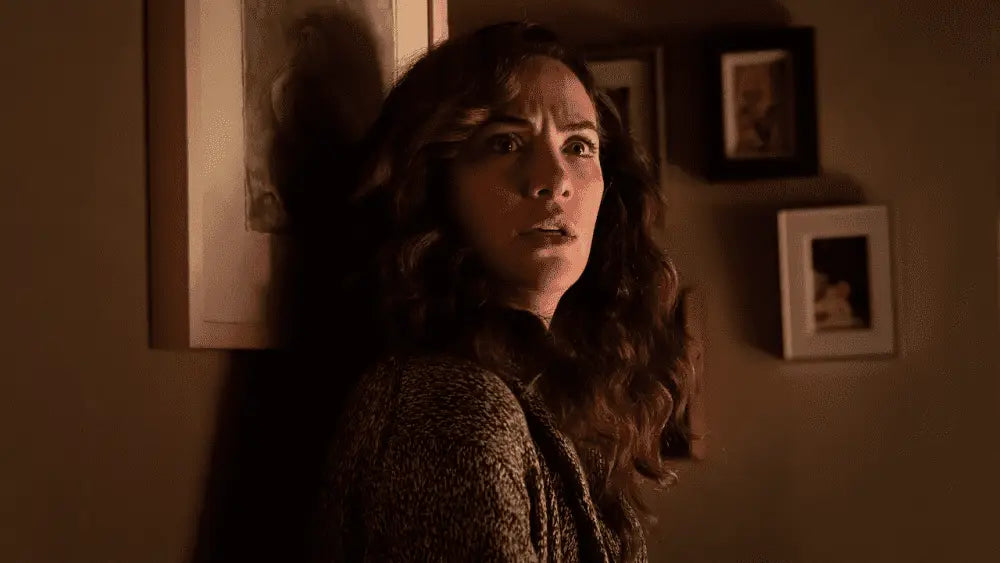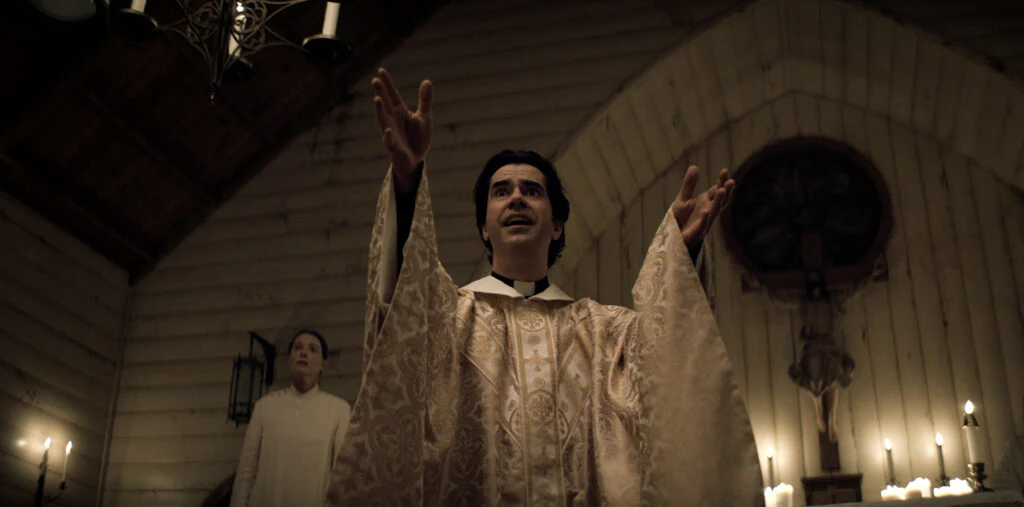Midnight Mass is a classic concoction of religious fervor and the ways it naturally spills over into horror; how faith can heal and comfort but also just as easily be used as a weapon, a justification of terrible deeds in the name of a higher power. The way belief and the desperation that often leads people to it can poison minds while seemingly revitalizing them is a constant thread in Mike Flanagan’s latest work, but it’s only one of many other bold and existential thoughts spilling out from the filmmaker throughout this seven episode journey.
Flanagan is best known for his previous series for Netflix, The Haunting of Hill House and The Haunting of Bly Manor, two distinct ghost stories that continue to captivate audiences with the way they both blend legitimate supernatural scares with riveting character drama. Midnight Mass is similar in that respect, but its scale and ideas feel far bigger than anything else Flanagan has put onscreen before. It’s not about ghosts and the paranormal (although Flanagan still can’t help but put one or two specters of the mind in there to symbolize characters’ guilt) but it’s certainly still operating under the rules and themes of otherworldly horror, though to say which monsters exactly are at play here would give too much away.

Courtesy of Netflix
While he writes his own screenplays, most of Flanagan’s projects are adaptations of previous works - Hill House comes from the Shirley Jackson novel, Bly Manor is based on Henry James’ famous story The Turn of the Screw, and he’s proven to be the rare filmmaker who actually understands Stephen King with his brilliant takes on Gerald’s Game and Doctor Sleep. Midnight Mass, while still obviously taking inspiration from others, is a wholly original story from Flanagan, one that the former Catholic altar boy considers to be his most personal. It’s been years in the making for one of the modern masters of horror, and its weighty ideas about faith, addiction, recovery, and greater purpose are all conversations Flanagan seems to be having with himself just as much as the characters are with each other.
The series takes place on Crockett Island, a small fishing community on its last legs in the modern day of late-stage capitalism. It’s a town where even the mayor appears to be dirt poor, where an oil spill that was swiftly followed by strict fishing regulations devastated the economy, and the few (mostly older) remaining residents rely on the only thing places like these have left: The church. Led by the feeble but respected Monsignor Pruitt, mass on Crockett Island is a familiar comfort for many, including Erin Greene (Kate Siegel), who finds herself back at her childhood home of “The Crock Pot” after escaping a disastrous relationship elsewhere. Also returning home is her old friend Riley Flynn (Zach Gilford), burdened with guilt and jadedness after spending years in prison following a deadly incident. Riley is automatically a town pariah not only because everyone is aware of what he did and where he’s been, but also due to the fact that he no longer believes in God and has no interest in attending services with his family, who he begrudgingly has to move back in with.
Riley’s arrival on the island coincides with the sudden appearance of Father Paul (Hamish Linklater), who states that Monsignor Pruitt has fallen ill whilst on a trip and thus is in need of a temporary replacement. Father Paul acts a bit odd at times, and when pressed about Pruitt’s condition he can definitely be dodgy, but his sermons ignite a newfound fire on the small island. As the priest starts to bring back some liveliness and passion to the town, the area gradually begins to see a full-blown religious revival, as more and more people come to the church. But this isn’t simply because Father Paul has a bit more gusto than his elderly predecessor; miracles also start taking shape on Crockett Island. Some are small, like people no longer having the need for glasses or aching backs suddenly starting to mend, but others are almost too incredible to believe. A young girl (Annarah Cymone) paralyzed by a shooting is suddenly able to walk again, an old woman suffering from dementia makes a shocking turnaround in her condition, and more wonders appear to happen under the guidance of the new priest.

Courtesy of Netflix
But things eventually go from miraculous to horrifying as strange and unnerving events also take hold, like a massacre of local wildlife, more and more people going missing, and a set of piercing eyes being spotted in the night. Midnight Mass is filled with lengthy and heavy conversations between its characters as they react to everything happening around them in correlation with their experiences from life, conversations that veer into deep musings about religion and meaning, addiction and forgiveness, judgement and closure, and pretty much any and all drunk and / or high thoughts that you’ve probably had late into the night with friends and loved ones. But the series also never forgets that it’s first and foremost a horror story, and a masterful one at that. While maybe not as immediately terrifying as Flanagan’s previous work, it gradually sets things up and reveals its secrets layer by layer, leading to what is undeniably one of the filmmaker’s greatest, most insane, carnage-filled climaxes of his career. The final two episodes are unrelenting and transcendent, but only thanks to the buildup that came before.
Midnight Mass is one of those works of art that sticks with you long after you’ve finished it. It lingers in the mind; its haunting and dark symbolic imagery, the tragedies and arcs of its characters, and its tackling of life’s biggest questions. Flanagan swings big, going after both the grand horror spectacle and the deep dive into existentialism. Few storytellers could do it with as much poignancy as he does, even fewer could pull off just how earnest it feels. For someone with an already outstanding body of work, it’s all the more impressive that this is his best work yet.
‘Midnight Mass’ begins streaming on Netflix September 24th.




